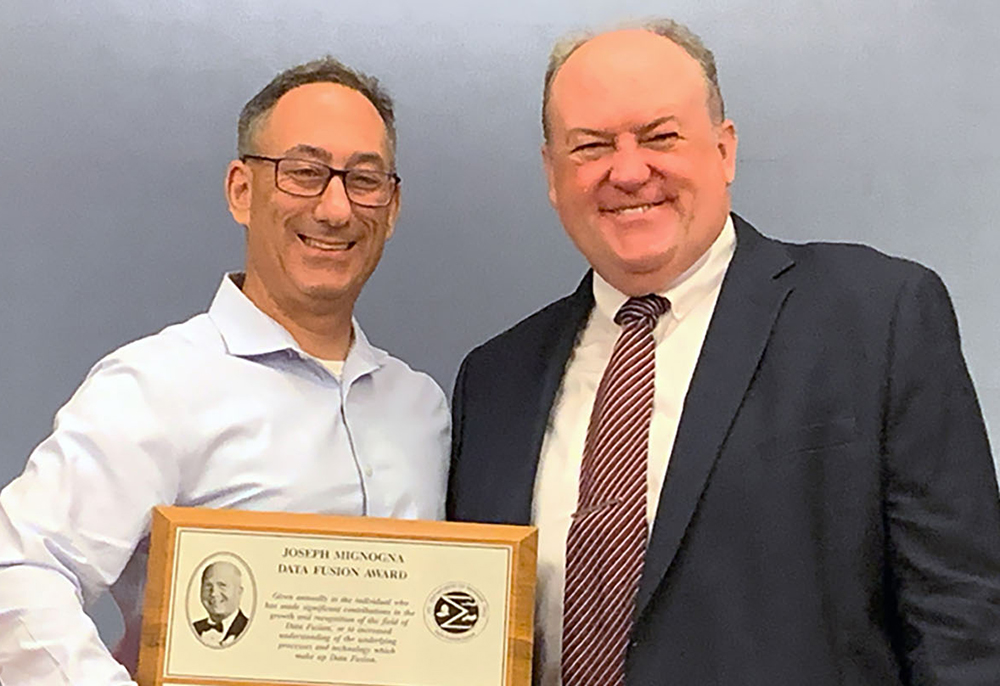
|
 |
Andrew Newman (left) with MSS NSSDF Chair Mark Owen following the Joe Mignogna Data Fusion Award ceremony. Photo credit: Military Sensing Symposia. |
|
Alum Andrew Newman (EE Ph.D. 1999), an engineer at the Johns Hopkins University Applied Physics Laboratory (APL) in Laurel, Md., was presented with the Joe Mignogna Data Fusion Award at the Military Sensing Symposia, National Security Sensor and Data Fusion (MSS NSSDF) conference in November.
At Maryland, Newman was advised by Professor P. S. Krishnaprasad. He has been with APL for more than 20 years.
Each year, the award honors a leader in the data fusion community. It is named in honor of Joseph Mignogna, a friend to the data fusion community who served the U.S. in World War II and the Korean War, and spent the second half of his career in various DoD and industry defense positions. The award was instituted in 1994.
Newman heads a team of more than 70 APL scientists, mathematicians and engineers in cutting-edge development and implementation of advanced data fusion and sensor resource management capabilities.
His technical contributions have addressed some of the nation’s most critical national security challenges. Newman pioneered upstream data fusion techniques — the processing, exploitation and fusion of sensor data as closely to the raw feed as possible. He led an Independent Research and Development (IRAD) effort, called Precision Engagement of Moving Targets (PEMT), to implement a robust upstream data fusion, multi-hypothesis tracking and closed-loop intelligence, surveillance and reconnaissance capability. This successful core data fusion capability was adapted for missions such as tracking non-emitting targets, space situational awareness, and maritime tracking and targeting.
“Data fusion exercises are exciting and messy,” Newman says. “During testing, we are fixing issues right up until the last minute. Then, the data trickles in and it’s a thrill and relief to see the results. This unknown keeps my work engaging and interesting. The data fusion community is filled with people who like to push the envelope.”
In 2016, Newman invented the game Reconnaissance Blind Chess (RBC). He then led the team that developed APL’s online application, spurring development of intelligence, surveillance, reconnaissance and targeting (ISR&T) and sensor resource management algorithms by researchers outside the traditional defense research and development community. RBC now helps researchers develop artificial intelligence and machine learning. It was featured as a tournament at the 2019, 2021 and 2022 Neural Information Processing Systems conferences.
“Andy’s skills as a technical researcher and developer in the data fusion field, his visionary leadership and mentorship of younger researchers, and his service to the broader data fusion community exemplify the hallmarks of the Joe Mignogna Data Fusion Award,” said Chris Baumgart, APL’s Intelligence, Surveillance, Reconnaissance and Targeting program manager.
Newman has published more than 50 research papers in data fusion, sensor tasking and management, machine autonomy for ISR&T and automatic control. He also has served for many years as a committee member and session chair for the MSS NSSDF conference.
“Andy is a leader and mentor to the up-and-coming professionals in our field,” said Mark Owen, the MSS NSSDF chair. “He offers guidance and encourages the community to collaborate, ensuring the best technologies and concepts are discussed and debated at the conference.”
“I’m honored to be in the company of the past recipients of the Joe Mignogna award,” Newman says. “They are incredibly talented individuals who have served as my mentors and are known for bringing the data fusion community together to think about challenges in new ways. I draw inspiration from these individuals as I encourage the next generation of data fusion experts.”
—ISR thanks JHU APL's Amanda Mantiply for this news. Read the original story here.
Related Articles:
Alum Fumin Zhang elected to IEEE Fellow
ECE and ISR alumni feature prominently at American Control Conference
Alum Timir Datta-Chaudhuri develops VNS biosensor for mice
Biofilm-fighting catheter insert research named 'featured article' in IEEE TBME
Nanotechnology pushes RI-based gas sensing forward
Rapidly evolving ‘smart marble’ sensors hold promise for monitoring pharmaceutical industry bioreactors and beyond
Alum Nima Ghalichechian receives NSF CAREER Award
Alumnus Fumin Zhang promoted to full professor at Georgia Tech
Alumna Jing Yang begins tenure-track position at Penn State
Adjustable Drug Release Marks New Milestone in Ingestible Capsule Research
November 29, 2023
|

